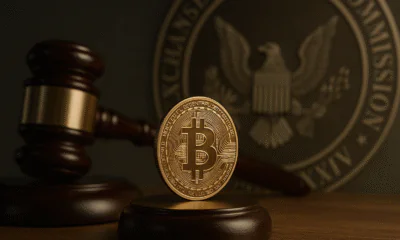Market News
Judge Presiding over Voyager Acquisition Scolds SEC in Decision

The tug of war continues between the US government and the bankruptcy court over Binance's US arm acquiring cryptocurrency lending company Voyager Digital.
On Wednesday, Michael Wiles, a judge in the Southern District of New York, ruled the $1bn USD purchase of Voyager assets by Binance.US must proceed, according to a court document, rejecting the US government's request that proceedings be halted until after an appeal.
US Attorney Damian Williams, on the other hand, had said that the agreement should be amended or struck down as it sought to essentially absolve Voyager and its employees of violating any tax or securities laws.
But Judge Wiles said that the agreement, which he had earlier approved, does not do so, and waiting any longer would hurt Voyagers customers, who had been unable to access their cryptocurrency since it declared bankruptcy in July 2022.
The government's documents “exaggerate and in some places mischaracterize what I have done and the authorities on which I have relied, and in other instances rely on hyperbole or on ‘straw man' arguments,” Wiles wrote.
The agreement's provisions “do not prohibit any regulatory action,” including actions that would stop the sale and distribution of cryptocurrencies the plan contemplates,” Wiles added. “Delays themselves also are a massive issue for the Debtors' customers.”
Under this acquisition plan, Voyager creditors could potentially make a 73% recovery. The court has already heard several witnesses covering complex topics, such as whether any personal data will be handed over to Binance.US as part of this settlement and why this transfer represents a better arrangement for creditors than an immediate liquidation.
Creditors have also questioned Voyager's financial advisors about treating exotic types of cryptocurrency assets and how customers from states like New York, Texas, Vermont, and Hawaii, where regulators will not allow Binance.US to operate, should be treated.
Under a separate agreement reached with Voyager, the Binance.US purchase, which was originally scheduled to go into effect on March 15, has been extended until March 20.
US Government Don't Want the Deal to Happen
Prior to Judge Wiles' ruling, the US government said in a filing that the $1 billion deal that Binance.US offered to buy assets from the failed crypto lender had to be delayed while it clarified critical legal objections.
This move followed an appeal by the US Trustee, a branch of the Department of Justice responsible for bankruptcy cases, which was concerned that the agreement effectively absolved Voyager and its employees from violating any tax or securities laws.
“The Court cannot tell the Government to speak now or forever hold its peace before Voyager and Binance.US wed,” US Attorney Williams said in his filing. “Nothing in the Bankruptcy Code permits courts to exculpate parties from liability to the Government for past and future conduct.”
Williams further said that the deal must be put on hold, or at least the parts limiting the government's ability to enforce its laws until the appeals are resolved before higher courts.
According to the motion filed by the US Trustee William Harrington and other government lawyers in a bankruptcy court in New York, the court had “improperly exceeded” its legal authority by authorizing the pardon. They asked for a two-week delay to be placed on the court's approval of the settlement to allow them to file an appeal.
This back and forth between the bankruptcy court and the US government is nothing new, as it has been going on for a long time, having begun eight months ago with Voyager filing for bankruptcy.
How did we get Here? Voyager Bankruptcy & FTX Fall
For the past two years, the crypto market has been in a tumultuous phase, with liquidity issues, bankruptcy, and fraud plaguing the nascent industry, bringing it under the microscope of regulators worldwide.
As the legal cases following the unfolding meltdown, former crypto broker Voyager, alongside Alameda Research, the investment arm of FTX, and crypto exchange Binance, all found themselves in the crosshairs of the US Securities and Exchange Commission (SEC) fighting over assets and funds in dispute.
Voyager is currently in the midst of the most critical legal battles, which stem from its bankruptcy filing on July 5, 2022. The company aimed to restore value to over 100,000 of its customers who collectively lost millions through its bankruptcy.
This was prior to the FTX liquidity crisis coming to light. And a month after the Voyager failure, it was revealed the cryptocurrency lender had a deep relationship with Alameda, which was also Voyager's largest shareholder, holding 11.56% of the company.
The auction for Voyager's assets began on September 13, which FTX won, following an offer of $1.4B on the company's assets. However, prosecutors in Texas in late October opposed the auction and launched an investigation of FTX over possible securities violations.
Before any settlement could occur, FTX, FTX US, and Alameda Research filed for Chapter 11 bankruptcy in the US, sending shockwaves throughout the crypto industry. It led to a domino effect of companies affected due to their proximity to FTX. The FTX implosion was the straw that broke the camel's back as the SEC amplified its attempts to oversee the cryptocurrency industry.
With FTX up in flames, as it found itself on the block, its bid for Voyager was also off the table. That is when Binance came into play.
SEC Gets a Scolding for “Highly Uncertain” Regulatory Environment
When Binance first stepped in, the exchange was even mulling the outright purchase of FTX, although it did not end up going through with it. Later, in mid-December, it was reported that Binance.US was planning on buying the assets of Voyager Digital for about $1B.
Shortly after that, the SEC filed a notice opposing Binance.US's acquisition in early January, citing its desire to see additional details included in a billion-dollar transaction between the two entities.
Although the SEC and the Texas lawmakers opposed the deal, the poll released in court documents revealed that 97% of surveyed Voyager customers supported the reorganization plan.
On March 7, bankruptcy judge Michael Wiles approved the settlement, saying the case could not go into an “indeterminate deep freeze” while regulators ironed out issues. The next day, though, the US Justice Department appealed against the approval.
Before that, on March 6, the SEC objected to the plan, citing the “extraordinary” and “highly improper” exculpation provisions. The SEC contended that Binance.US was operating as an unregistered securities exchange — an assertion to which Binance.US objected — and that the repayment tokens would constitute an unregistered securities offering.
This time though, the federal judge overseeing Voyager's effort to sell itself to Binance.US has some harsh words for the regulators, calling on the lack of regulatory clarity provided by the SEC and CFTC.
“There are firms that operate as cryptocurrency brokers or exchanges and have done so for several years, without being subject to clear and well-defined regulatory requirements. Regulators themselves cannot seem to agree as to whether cryptocurrencies are commodities that may be subject to regulation by the CFTC, or whether they are securities that are subject to securities laws, or neither, or even on what criteria should be applied in making the decision. This uncertainty has persisted despite the fact that cryptocurrency exchanges have been around for a number of years,” said Judge Wiles in his most recent ruling.
Meanwhile, referring to remarks from the SEC's William Uptegrove, who told the court SEC staff believed Binance.US was operating an illegal securities exchange, as financial instruments must be registered with the regulatory body, Mark Renzi, Voyager's financial adviser, said: this was surprising to the debtor.
With Limited SEC Guidance, Everyone is Simply Left to Guess
Besides ripping into the regulators for not providing regulatory clarity to the sector, Judge Wiles also talked about the urgency of the matter, stating that there is no knowing just how long it will take for Congress and competing regulatory authorities to sort things out.
“I have no idea how long that's going to take, and we can't do that in bankruptcy,” he said. “[W]e can't just put everything on pause just because we don't know for sure how the regulators will eventually make up their minds on points that they seem to have been debating for years.”
He further stated that SEC's objections might not be sufficient to justify delaying approval of the deal either.
“Bankruptcy Code doesn't contemplate an endless period of time,” the judge said. “Things have to be done. We have creditors who are waiting and who in the midst of all this uncertainty have no access to property in which they've invested in some cases their life savings, so we have to take some kind of action. We have to do something.”
Besides the legal nature of Binance.US, Judge Wiles also showed considerable skepticism over the SEC's arguments that Voyager's VGX token might be an unregistered security.
Judge Wiles said that the agency has been aware of the VGX token's existence for some time now, and still, the regulator hasn't reached a conclusion regarding the nature of the token. Not to mention, the token is still trading, added the judge.
“I do not know how any party could possibly be expected to address the SEC's comments with the limited guidance that the SEC has provided. The SEC did not explain why the VGX token should be regarded as a security, for example, leaving me only to guess what the arguments might have been. Similarly, the SEC did not explain why it thought Binance.US might be operating as a securities broker,” said Wiles in the official document.
He added, “I do not know, for example, if there is one specific cryptocurrency token that may have been traded by Binance.US and that the SEC thinks was security (for which the relevant remedy might simply be to stop trading in that token), or whether the SEC has different theories. If we were to try to address the issues, we would have to guess what the issues were, and would have no idea if we were even discussing the right points.”
And even if there are problems with the sale or distribution of Voyager's VGX tokens, “there is no reason to my knowledge why that would or should impede or affect the remainder of what the Debtors are proposing,” said the bankruptcy Judge.
Voyager, on its part, has denied the SEC's allegation that its VGX token is a security. Voyager “disagree[s] with any assertion, by SEC staff or otherwise, that VGX is a security, and the debtors' view is supported by a legal opinion from a nationally recognized law firm,” said Voyager's Renzi in a statement.
He further stated that Voyager had given SEC the information about VGX on this subject about a year and a half ago and, therefore, could reasonably consider this issue closed.
A filing with the US Bankruptcy Court for the Southern District of New York on behalf of Voyager earlier this month, meanwhile, stated that delays in closing the deal cost the company $10 million a month and the lengthy legal process meant fewer funds for distributions to creditors.
The company expressed its surprise about delays and evolving SEC positions on the issue and called for the bankruptcy process to be resolved quickly.
“The debtors cannot responsibly delay any further to accommodate the SEC's apparent evolving deliberative process,” it added.
FTX's Alameda in the Mix
Amid all this, on January 30, Alameda Research filed suit against Voyager Digital for $446 million, alleging that the crypto lender had “knowingly or recklessly” funneled customers' money to Alameda.
After filing this suit, Voyagers lawyers served a subpoena to FTX co-founder Bankman-Fried (SBF) as well as to Alamedas former CEO Carolyn Allison, FTX co-founder Gary Wang and Ramnic Arora, head of products for FTX.
On February 19, SBF was served by Voyager's creditors with a summons to appear at trial for a “remote deposition.”
On March 8, court documents revealed Delaware bankruptcy Judge John Dorsey approved a $445 million settlement with Voyager Digital, based on the Alameda suit.
Texas and New Jersey regulators have warned that this potential 73% creditors recovery might get stifled considerably if FTX's Alameda Research manages to claw back $445 million of loan payments made prior to its own November bankruptcy filing.
However, Judge Wiles eventually decided these regulatory objections did not overcome the need to move forward with Voyager's restructuring. Judge Wiles said, “The handling of the claims on Alameda Loans is also subject to a separate order that will be filed at a later date.”
The case among the three entities with respect to lawmakers and regulatory agencies across the United States is still ongoing.












